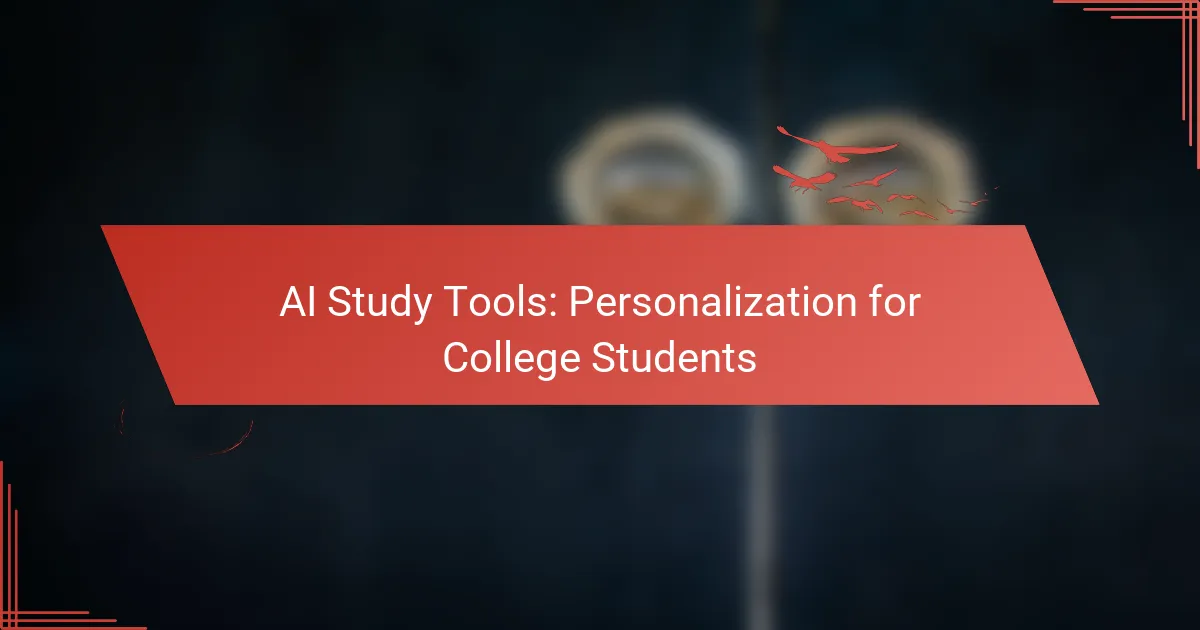AI study tools for college students are designed to enhance learning through personalized features that cater to individual needs. By utilizing data-driven approaches, these tools adapt content and study strategies, making study sessions more efficient and effective while helping students achieve their academic goals.

What Are the Best AI Study Tools for College Students?
The best AI study tools for college students enhance learning through personalized features, making study sessions more efficient and effective. These tools cater to various needs, from organizing notes to improving writing skills, ensuring students can focus on their academic goals.
Quizlet
Quizlet is a versatile study tool that allows students to create digital flashcards and interactive quizzes tailored to their coursework. It employs spaced repetition algorithms to optimize learning, helping students retain information over time.
Students can access a vast library of pre-made study sets or customize their own, making it suitable for a wide range of subjects. Utilizing Quizlet’s game-like features can make studying more engaging and less monotonous.
Grammarly
Grammarly is an AI-powered writing assistant that helps students improve their writing by providing real-time feedback on grammar, punctuation, and style. It offers suggestions tailored to the context of the writing, whether it’s an essay, report, or email.
Using Grammarly can significantly enhance the quality of academic writing, ensuring clarity and coherence. Students should consider the premium version for advanced features like plagiarism detection and genre-specific writing style checks.
Notion
Notion is an all-in-one workspace that combines note-taking, task management, and database functionalities. It allows students to create customized pages for different subjects, integrating notes, schedules, and resources in one place.
By using templates and collaborative features, students can streamline their study processes and work effectively in groups. Notion’s flexibility makes it suitable for organizing both academic and personal projects.
Evernote
Evernote is a powerful note-taking app that helps students capture and organize information from various sources. It supports text, images, and audio notes, making it easy to compile research and lecture materials.
Students can use tags and notebooks to categorize their notes, ensuring easy retrieval later. The web clipper feature allows users to save articles and web pages directly to their Evernote account, enhancing research efficiency.
Microsoft OneNote
Microsoft OneNote is a digital notebook that enables students to jot down notes, draw diagrams, and collaborate on projects. Its integration with other Microsoft Office tools makes it a convenient choice for students already using Word or Excel.
OneNote supports multimedia notes, allowing students to embed videos and audio recordings. The ability to organize notes in sections and pages helps maintain a clear structure, which is crucial for effective studying.

How Do AI Study Tools Personalize Learning?
AI study tools personalize learning by utilizing data-driven approaches to tailor educational experiences to individual student needs. These tools adapt content, pacing, and study strategies based on performance and preferences, enhancing engagement and effectiveness.
Adaptive Learning Algorithms
Adaptive learning algorithms analyze a student’s interactions and performance to adjust the difficulty and type of content presented. For instance, if a student struggles with a particular math concept, the algorithm may provide additional practice problems or alternative explanations until mastery is achieved.
These algorithms often use machine learning techniques to improve over time, becoming more accurate in predicting what a student needs. This adaptability can lead to a more efficient learning process, allowing students to focus on areas where they require the most support.
Customizable Study Plans
Customizable study plans allow students to set their own learning goals and choose the subjects or topics they want to focus on. This flexibility empowers students to create a study schedule that fits their personal preferences and academic requirements, making learning more relevant and engaging.
For example, a college student preparing for exams can prioritize subjects based on upcoming deadlines or areas of difficulty. Many AI tools offer templates or suggestions for study plans, helping students structure their time effectively while still allowing for personal adjustments.
Real-time Feedback
Real-time feedback provides immediate insights into a student’s performance, helping them understand their strengths and weaknesses as they study. This instant feedback can come in various forms, such as quizzes, interactive exercises, or progress tracking dashboards.
For example, if a student answers a question incorrectly, the AI tool can immediately highlight the mistake and offer explanations or resources for improvement. This timely information enables students to correct misunderstandings quickly and reinforces learning, making study sessions more productive.

What Are the Benefits of Using AI Study Tools?
AI study tools offer personalized learning experiences that enhance academic performance for college students. By adapting to individual learning styles and pacing, these tools can significantly improve study effectiveness and efficiency.
Improved Retention Rates
AI study tools can boost retention rates by tailoring content to match a student’s unique learning preferences. For example, spaced repetition algorithms help reinforce material at optimal intervals, making it easier to remember key concepts over time.
Students using AI tools often report retention improvements of 20-30% compared to traditional study methods. This is particularly beneficial for subjects that require memorization, such as languages or sciences.
Time Management
Effective time management is crucial for college students, and AI study tools can assist in organizing study schedules. These tools often include features like reminders and progress tracking, helping students allocate time efficiently across different subjects.
By analyzing study habits, AI can suggest optimal study times and break durations, which can enhance productivity. Students may find that using these tools allows them to complete assignments in significantly less time than before.
Enhanced Engagement
AI study tools promote enhanced engagement by providing interactive and dynamic learning experiences. Features such as gamification and personalized quizzes keep students motivated and make learning more enjoyable.
Engagement levels can increase by incorporating multimedia elements, such as videos and simulations, which cater to various learning styles. This approach not only makes studying more interesting but also helps maintain focus, reducing the likelihood of distractions.

How to Choose the Right AI Study Tool?
Choosing the right AI study tool involves understanding your learning preferences, evaluating the tool’s features, and comparing pricing options. A well-suited tool can enhance your study efficiency and help you achieve your academic goals.
Assess Learning Styles
Identifying your learning style is crucial when selecting an AI study tool. Whether you are a visual, auditory, or kinesthetic learner, the tool should cater to your specific preferences to maximize effectiveness.
For example, visual learners may benefit from tools that incorporate diagrams and videos, while auditory learners might prefer those with voice recognition and audio explanations. Take a moment to reflect on how you learn best before making a choice.
Evaluate Features
When evaluating features, consider what functionalities are most important for your study needs. Look for tools that offer personalized study plans, progress tracking, and adaptive learning capabilities.
Some tools may include collaborative features, allowing you to study with peers, while others might focus on content generation or quiz creation. Make a list of must-have features and compare them across different options.
Compare Pricing Models
Pricing models for AI study tools can vary widely, from one-time purchases to subscription-based services. Assess whether the pricing aligns with your budget and the value you expect to receive from the tool.
Many tools offer free trials or tiered pricing, allowing you to test functionalities before committing. Be cautious of hidden fees and ensure that the tool provides sufficient features at its price point to avoid overspending.

What Are the Costs of AI Study Tools?
The costs of AI study tools can vary significantly based on features, subscription models, and additional services. College students should consider both direct costs, such as subscription fees, and indirect costs, like potential upgrades or supplementary resources.
Subscription Fees
Subscription fees for AI study tools typically range from around $10 to $30 per month, depending on the platform and features offered. Some tools may provide a free tier with limited functionality, while premium versions unlock advanced capabilities like personalized learning paths and analytics.
When evaluating subscription options, consider whether the tool offers a trial period. This allows students to assess the tool’s effectiveness before committing financially. Additionally, look for student discounts, which many services provide to make their offerings more affordable.
Be aware of potential hidden costs, such as in-app purchases or fees for additional resources. Always read the terms of service to understand what is included in the subscription and what may incur extra charges.



